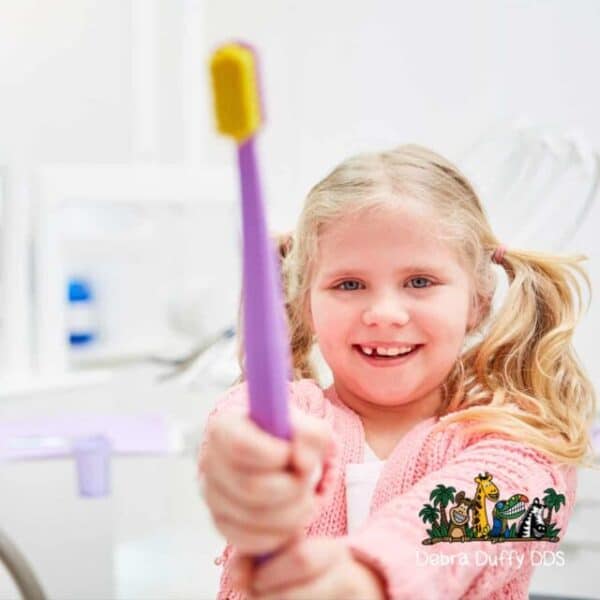
According to the Centers for Disease Control and Prevention, one in five children in the United States have untreated tooth decay and poor dental practices (such as not brushing their teeth regularly) that they carry into adulthood.
This is an alarming fact, because oral hygiene has been linked to a number of health complications, such as cardiovascular diseases, diabetes, respiratory issues and even cancer.
It is up to parents to ensure that their children are practicing good dental hygiene from a very young age, so by the time they’re in their rebellious teen years, the habit is already too well ingrained in them to be cast aside when parents are not monitoring their daily activities.
In this article, we’re going to discuss the best toothbrushes for kids in every age group, so the next time you’re picking one out at the pharmacy or grocery store, you’ll be confident that you’re making the right choice.
Dental Care For Ages 0-2
Dental care should begin at a very early age, even when a baby has no teeth. Did you know that at birth, the first 20 primary teeth are already developing in a baby’s jaw, getting ready to appear between the teething ages of 6 months and 1 year?
Even though they will eventually fall out, baby teeth have an important role to play because they hold space in the jaw for the permanent teeth, guiding their growth to avoid overcrowding and other developmental issues.
A finger toothbrush is your baby’s first gum care tool before the first tooth erupts. They fit on an adult finger and the regular gum massaging action helps to remove accumulation of bacteria. You can also use a soft cloth to wipe gums after the first feeding in the morning and right before bed.
Dental Care For Ages 3-5
By the time your kid is a toddler, regular brushing twice a day should become the norm under adult supervision.
A good toothbrush for toddlers will have a head that is small enough to fit his/her mouth. We recommend soft bristles with ends that are rounded or polished to soothe gums and protect tooth enamel.
Dental Care For Ages 6-8
By the time a child reaches the age of 6, tooth decay becomes a practical concern that parents have to be aware of. 1 in 5 kids (starting from the age of 5) have decaying teeth, says the Center for Disease Control And Prevention, and if left untreated, the problem can escalate, setting the stage for an unhealthy oral profile for life.
Buy age-appropriate toothbrushes at this time with a child-friendly brush head and handle. Fun colors and designs add the incentive they need to make brushing teeth twice a day seem like an entertaining activity instead of a chore.
Electric toothbrushes are a quick and acceptable choice during these years and beyond. The rotation-oscillation movement of electric brushes, when practiced with the right brushing techniques, offer a more thorough cleaning and is an effective solution against plague deposits and other oral accumulations that can lead to unhealthy teeth and gums.
This is also a good time to teach them the basics of good dental hygiene.
For example:
• Brushing teeth for at least 2 minutes to ensure a thorough clean.
• Using a soft-bristled toothbrush. Hard bristles can damage young gums and tooth enamel.
• Aiming the toothbrush at a 45-degree angle towards the gum line.
• Using gentle circular motions to brush along the gum line.
• Brushing the outer and inner surfaces of all teeth.
• Brushing the tongue with a soft-bristled toothbrush to remove bacteria.
Dental Care For Ages 9-12
Typically, all 28 permanent teeth should have erupted by the time a child is 13. Ages 9-12, therefore, is the transitional phase, and the best time to teach kids how to brush the right way.
Your pediatric dentist can help you simplify the process with easy-to-follow tips that your child can understand on brushing techniques to remove plaque, food deposits etc. As a parent, your job during these transitional years is to make sure that teeth brushing is not a cursory affair and the proper method for healthy and effective brushing is being followed on a daily basis.
Dental Care For Ages 13-17
By the time a child is within this age range, regular brushing and flossing should have become a lifetime habit.
As parents, it is important to remember though that this is a period in a child’s development when they are likely to eat more sugary and carb-rich foods and become prone to infections, caries and periodontal diseases.
Conclusion
If you are not sure whether you are teaching your kids how to brush their teeth correctly, it is best to consult the pediatric dentist, Dr. Debra Duffy.
A pediatric dentist can not only give you personalized instructions, but they can also identify any potential problems with children’s teeth or gums before they become serious. For example, they can spot early signs of gum
disease or tooth decay so that you can get treatment before the problem gets worse.
If you have any questions, be sure to let us know! Call Debra Duffy D.D.S. at 972-724-1617 or request an appointment online here.

Comments are closed.